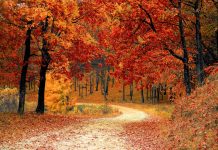A Garden Past
I should have known
when blooms wilted
then dropped like confetti,
when leggy weeds sprang up
to swallow both rain and sun
that there was no coming back
from the brambles;
the garden we once tended gone—
now grown wild with accusations
soil barely clinging to roots, rot-bitter
with beetle bites and half-spun truths.
If possible, I’d start over,
dig out every last stem and leaf
till up the past, turn topside down
let earthworms regurgitate each clump
and create something new.
Purging
I open the cupboard,
breathe in the scent
of potatoes-lain-too-long,
eye the haphazardly stacked cans,
many beyond expiration dates.
Did I need three bottles of ranch,
two jars of sweet pickles,
excessive cartons of chicken broth?
Perhaps the shelves buckle
under my careless abundance
out of fear of forgetting something,
of arranging the ingredients
for some elaborate dinner,
only to realize I’d neglected to buy
the most important thing of all.
Or perhaps I had planned on using
three cans of yams last Thanksgiving
but only used two.
I drag the garbage can closer,
casting accusatory glances
at boxes and cans, as if they are to blame
for their own useless existence
within the confines of my cupboard.
But when I’m finished,
I breathe in a sigh of relief,
reveling in the new-found space
and its airy possibilities
of collecting dates not yet seen.
Ornamental
The cobblestones are warm beneath my sandaled feet,
stores with open faces beckon me in to touch, to feel.
I smile at the easy, eager voices, Come in. Come in! Each
welcoming me with open arms, not as foreigner but friend.
I sweep in and out of shops, my senses sharpened by colors,
my arms soon laden with jewelry, blankets, and amber honey.
I purchase not things but memories, each richly steeped
like tea bags in Grecian mountain air. I look up at the oranges,
round bulbs hanging from lush-leaf trees that border streets.
I would pick one, if not for the words of a Greek guide: No good,
she says, only decoration, fruit is sour, you not like.
But I do like—these wonderful, useless oranges that offer nothing
but the faded evening glow cast by an ancient sun.
To read more poems by the same author, click here
About the Author
Arvilla Fee lives in Dayton, Ohio with her husband, three of her five children, and two dogs. She teaches for Clark State College, is the lead poetry editor for October Hill Magazine, and has been published in over 100 magazines. Her three poetry books, The Human Side, This is Life, and Mosaic: A Million Little Pieces are available on Amazon. Arvilla’s life advice: Never travel without snacks. Visit her website and her new magazine: https://soulpoetry7.com/












